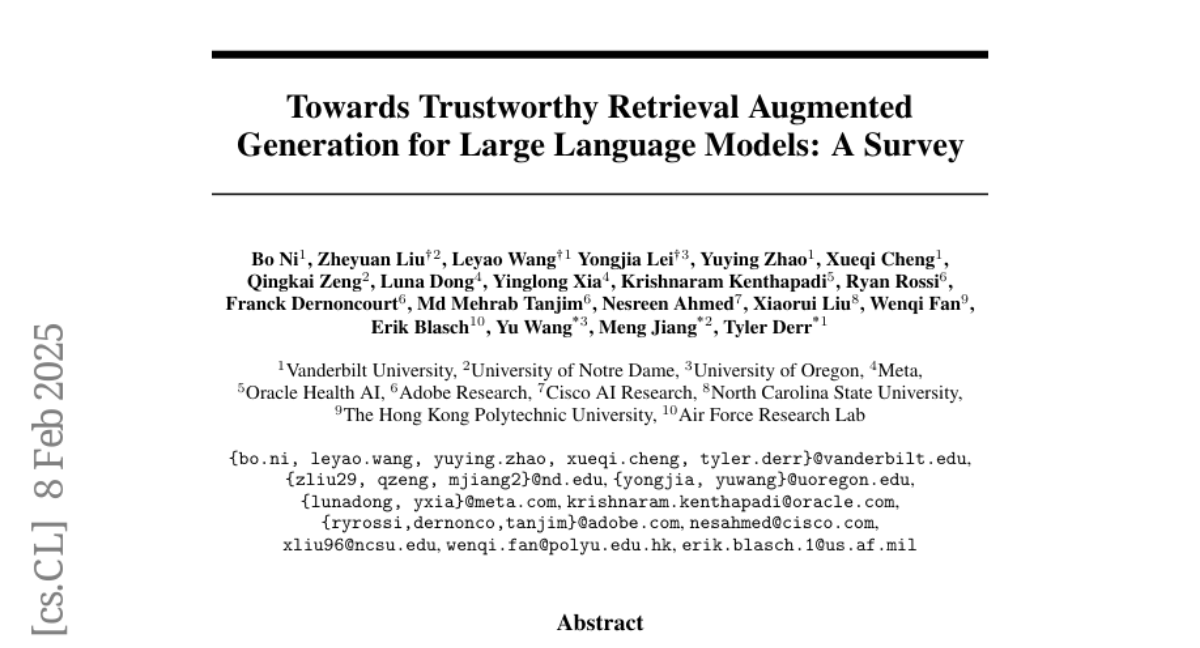Towards Trustworthy Retrieval Augmented Generation for Large Language Models: A Survey
Bo Ni, Zheyuan Liu, Leyao Wang, Yongjia Lei, Yuying Zhao, Xueqi Cheng, Qingkai Zeng, Luna Dong, Yinglong Xia, Krishnaram Kenthapadi, Ryan Rossi, Franck Dernoncourt, Md Mehrab Tanjim, Nesreen Ahmed, Xiaorui Liu, Wenqi Fan, Erik Blasch, Yu Wang, Meng Jiang, Tyler Derr
2025-02-13

Summary
This paper talks about Retrieval-Augmented Generation (RAG), a new way to make AI-generated content more trustworthy and accurate. It's like giving AI a smart reference book to check facts before it speaks.
What's the problem?
While RAG helps AI create better content by using external information, it also brings new risks. These include problems with reliability, privacy concerns, potential for misuse, and issues with fairness and explaining how decisions are made. It's like giving a student a powerful tool that can be really helpful, but also potentially misused if not handled carefully.
What's the solution?
The researchers created a comprehensive guide for making RAG systems more trustworthy. They looked at five main areas: reliability, privacy, safety, fairness, and the ability to explain decisions. For each area, they organized existing solutions and pointed out where more research is needed. It's like creating a roadmap for scientists to follow to make AI systems that use RAG more responsible and dependable.
Why it matters?
This matters because as AI becomes more common in our daily lives, we need to make sure it's trustworthy. By addressing these issues in RAG systems, we can create AI that's not only smarter but also more reliable, fair, and safe to use. This could lead to better AI assistants, more accurate information systems, and more responsible use of AI in important areas like healthcare, finance, and education.
Abstract
Retrieval-Augmented Generation (RAG) is an advanced technique designed to address the challenges of Artificial Intelligence-Generated Content (AIGC). By integrating context retrieval into content generation, RAG provides reliable and up-to-date external knowledge, reduces hallucinations, and ensures relevant context across a wide range of tasks. However, despite RAG's success and potential, recent studies have shown that the RAG paradigm also introduces new risks, including robustness issues, privacy concerns, adversarial attacks, and accountability issues. Addressing these risks is critical for future applications of RAG systems, as they directly impact their trustworthiness. Although various methods have been developed to improve the trustworthiness of RAG methods, there is a lack of a unified perspective and framework for research in this topic. Thus, in this paper, we aim to address this gap by providing a comprehensive roadmap for developing trustworthy RAG systems. We place our discussion around five key perspectives: reliability, privacy, safety, fairness, explainability, and accountability. For each perspective, we present a general framework and taxonomy, offering a structured approach to understanding the current challenges, evaluating existing solutions, and identifying promising future research directions. To encourage broader adoption and innovation, we also highlight the downstream applications where trustworthy RAG systems have a significant impact.